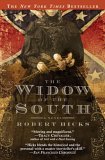Reading Guide Questions

Please be aware that this discussion guide will contain spoilers!
- It seems that Carrie doesn't come alive until literally everyone around
her is dying. Why do you think it took her home being taken over by the
Confederate Army and turned into a hospital to awaken Carrie out of her
stupor?
- Do you believe that Zachariah really wanted to die when he picked up the
colors on the battlefield? Why does Nathan Stiles spare Zachariah on the
battlefield specifically, when others carrying the colors were killed? Is
Zachariah grateful to be spared, or is he regretful, or a little of both,
and why?
- Does John McGavock undergo a character transformation from the beginning
of the novel, when he and Theopolis encounter the gang of ruffians in the
woods, to the end, when we see scenes him of him wandering around Franklin
somewhat aimlessly? How do you think he views the war? How do you think he
views his role, or his non-role, in the war? And how does this compare with
Carrie's attitude towards the war?
- In the author's note Robert Hicks says of Mariah, "… I have
concluded that Mariah may well have been the most complete human of them
all." Mariah never let her enslavement define her. Do you agree?
- Discuss how the death of their children affected both Carrie and John.
What is the difference between the attachment mothers and fathers have with
their children? Do you think John would have begun drinking whether his
children had died or not? And do you think Carrie had a propensity for
eccentricity and seclusion?
- When Carrie first notices Zachariah in her upstairs guest room, she
remarks: "Unlike most of the men, he looked ready to die. He looked as
if he were welcoming it, urging it along…I wanted his eyes on me."
Why does Carrie take to Zachariah, and why does she later give him special
treatment? Do you think it was purely physical attraction? Does Zachariah's
welcoming of his own death conflict with Carrie's values?
- Faith plays a large part in each character's motivations. Discuss the role
of belief in a higher power and how it guides Carrie, Zachariah, and Mariah
in their actions. For most of us, our belief system changes or 'grows' over
the span of our lives, one way or the other. How did Carrie's faith change
over the span of the novel?
- Why do you think Carrie beats Zachariah on the porch? Were you surprised
by this or did you understand it?
- Zachariah and Carrie have an intense love affair yet it's never
consummated sexually. Do you think the fact they were never physically
intimate takes away or adds to their relationship, or does it matter?
- At one point Carrie tells Mariah, "You always could have left, even
when you weren't allowed. I would have never stopped you." Do you think
this is true? Carrie seems to think of Mariah as her best friend, but she
was really her property, a "gift" her father gave to her as a
child. Do you think Carrie tries to make herself appear a better
friend/owner than she really was? Discuss Carrie and Mariah's relationship.
Could friendship really transcend enslavement?
- Among the political issues leading up to the Civil War was the South's
strong adherence to the doctrine of 'state's rights.' Among the issues to
come out of the war was the emancipation of the enslaved in the 'slave
states,' whether they had remained loyal to the union or had seceded and
joined the Confederacy. Yet, neither of these political issues is ever
addressed 'head-on' in the book. Why do you think that is?
- Carrie comes from a rich, educated family. She is "learned."
Zachariah is poor, and almost illiterate. Yet do you think one is wiser than
the other?
- Robert Hicks has said, "good writing is about transformation."
We see transformation in Carrie, Zechariah and in their relationship, in
John, in his and Carrie's relationship, in Mariah and her relationship with
Carrie. Are we left with any sense that Mr. Baylor ever comes to any real
peace about what has happened?
- What does Carrie mean when she says the following to Zachariah: "You
are my key. You will explain things I have not been able to understand…I
want you to explain to me why I wanted you to live and why I was able to
make you live. Because I don't understand, not really, and the answer is
very important to me." What is Carrie not able to understand about
herself, and what answer does she think Zachariah will be able to provide?
- Carrie takes Eli into her home and he quickly assumes the role of a
surrogate son and Winder's surrogate brother. How do Carrie's actions speak
to her changing perceptions of family? Has her work running the hospital
changed her maternal instincts or is she simply responding to the nature of
war?
- At the town party, Carrie remarks about how she doesn't fit in with the
other women; Mrs. McEwen pokes fun of her efforts and jokingly calls her
"St. Carrie." Why do these women resent Carrie, and does it bother
her? Does Carrie see herself as saintly?
- In 1894, after John has died, and Mariah, Carrie and Zachariah are all
elderly, why does Zachariah not profess his love for Carrie more overtly?
Over time, did his love become more of respect and admiration for her
heroism, or are his feelings for her just as romantically intense?
Unless otherwise stated, this discussion guide is reprinted with the permission of Grand Central Publishing.
Any page references refer to a USA edition of the book, usually the trade paperback version, and may vary in other editions.

 Book Reviewed by:
Book Reviewed by:



